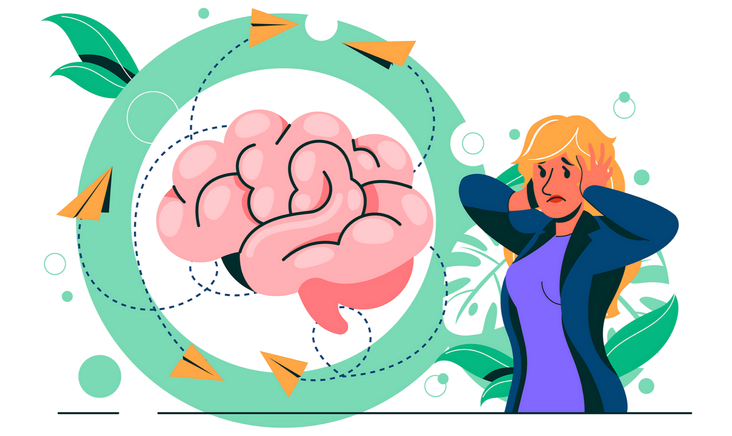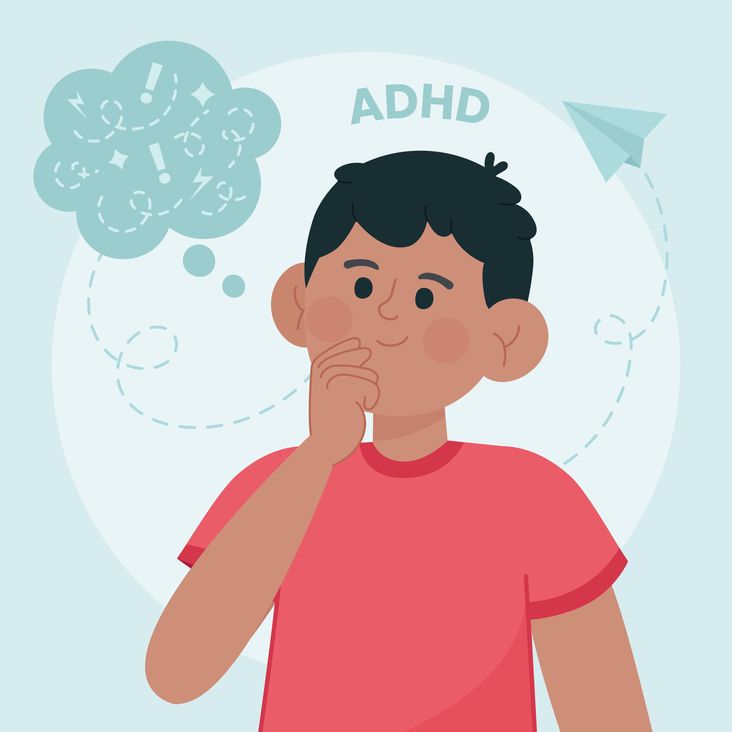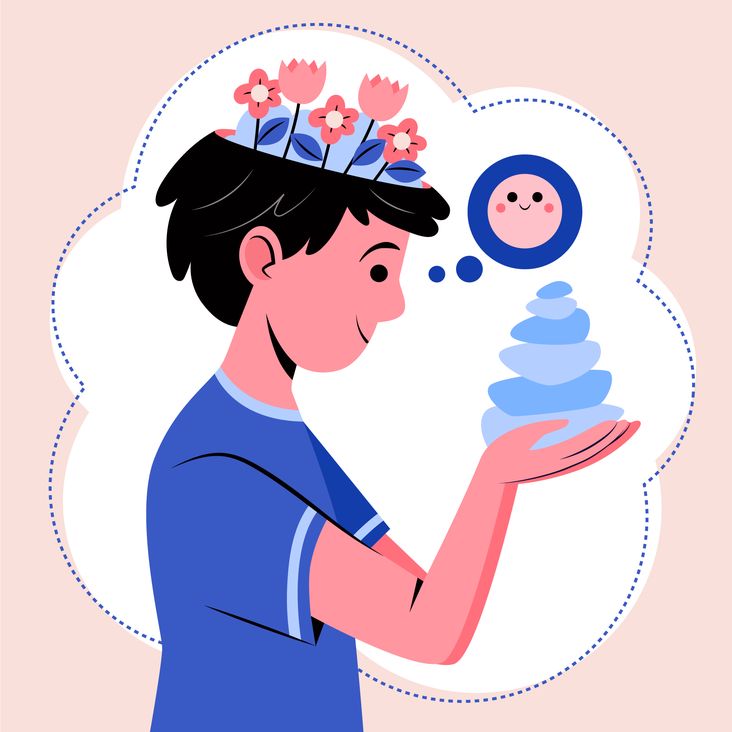How to Focus With ADHD
Jul 11, 2023 by Vreny Blanco · 8 min read · ADHD

Living with Attention Deficit Hyperactivity Disorder (ADHD) can be challenging, especially when trying to stay focused on a task. Dealing with scattered thoughts and struggling to focus can negatively impact many areas of your life, including school, work, and home.
Many people find it difficult to maintain concentration due to the many sources of distraction in our modern world. But especially for those with ADHD, being distracted can lead to frequent procrastination. It is essential to understand that this difficulty in maintaining focus does not reflect negatively on one’s character or work ethic and is not a sign of laziness or rudeness.
This article aims to provide practical tips and strategies to help you improve your attention and focus if you have ADHD. It emphasizes the importance of self-awareness and encourages you to explore and discover which methods work best for you. By incorporating effective techniques and exploring different approaches, anyone with ADHD can improve their attention and achieve success.
What is ADHD?
ADHD, or Attention-Deficit Hyperactivity Disorder, is a developmental disorder characterized by persistent patterns of inattention, hyperactivity, and impulsivity. The impact of ADHD symptoms can significantly disrupt daily activities and relationships. Originating in childhood, ADHD can persist through adolescence and into adulthood.
While children with ADHD may struggle with focusing and controlling impulsive behaviors, and often display hyperactivity, adults might face challenges such as unstable relationships, poor job performance, and low self-esteem, among other issues.
What causes ADHD?
Although the exact causes of ADHD are unknown, research suggests that genetics, environment, and developmental problems may play a role.
Scientists are also studying several environmental factors that may increase the risk of developing ADHD. These include alcohol and tobacco use during pregnancy, brain injury, nutrition, premature birth or low birth weight, and the social environment, such as exposure to lead during childhood.
Consequences of ADHD
ADHD can affect the quality of life.
It’s important to recognize that adults with ADHD may face challenges in productivity due to difficulties with time management, tendencies toward procrastination, and susceptibility to distractions.
However, these are potential challenges rather than guaranteed outcomes, as experiences with ADHD can vary greatly from person to person. Additionally, adults with ADHD may experience co-occurring mental health conditions, such as anxiety and mood disorders, which can further affect social functioning, including maintaining stable relationships, and contribute to antisocial behavior and diminished self-esteem.
How to Improve Focus With ADHD
The most common treatments for ADHD include behavioral therapy and medication. However, in addition to these approaches, several strategies can help you manage your symptoms and improve your focus.

1. Understand Yourself
- Recognize that getting distracted and having trouble concentrating is common in people with ADHD. Knowing why you have difficulty concentrating can help you cope better.
- Try different techniques to see what works best for you.
2. Establish a Routine
- Establishing a structured daily routine can provide stability and help people with ADHD stay organized.
- Set specific times for activities such as waking up, eating, studying, working, walking the dog, relaxing, etc.
3. Eliminate Distractions
- Minimizing distractions can help you focus.
- Find a quiet place to work or study, and turn off notifications on electronic devices.
- If necessary, use noise-canceling headphones.
- Request a quiet office at work.
- Close your office door.
- Limit daily screen time on TVs, computers, phones, and other electronic devices.
Block Digital Distractions
- Block digital distractions with 1Focus. 1Focus prevents you from being distracted by time-consuming and addictive content.
- Block websites and apps during working hours.
- Block all websites except the specific ones you need for work or study, to ensure monotasking.
- Block social media and other distracting and time-consuming content such as YouTube, Netflix, email, etc.
4. Create a Productive Environment
- Maintain a clean and organized workspace.
- Use digital organizational tools such as reminders and calendars.
- Make a list of priorities for the day.
- Set your computer to send reminders for meetings and important dates, such as deadlines.
5. Use Visual Cues
- Visual cues can be a helpful way to remind yourself of important tasks and deadlines.
- Posting sticky notes, using color-coded calendars, or setting digital reminders can all serve as visual cues to help you stay on track.
6. Anticipate Obstacles and Plan Ahead
- Write down all possible obstacles that may arise when trying to complete a task. Then, brainstorm possible solutions to overcome them.
- Schedule time each day to respond to messages and e-mails so they don’t interfere with your other responsibilities.
7. Break Tasks Into Smaller Steps
- Complex tasks can feel overwhelming and make it hard to focus. Breaking them down into smaller, more manageable steps can make them less intimidating.
- Seek clarity about upcoming tasks and projects by asking questions. The more details you know, the easier it will be to understand what needs to be done.
8. Focus on One Thing at a Time
- Focusing on one step at a time will improve your concentration.
- Make a to-do list and rank your tasks in order of importance.
- Start with the most important/challenging task.
- Give that one task your full attention for a period of time, take a break, repeat, or move on to the next task on your to-do list.
9. Manage Your Time
- Plan your day in advance.
- Designate specific blocks of time for different tasks or activities. Time blocking helps create a structured routine, increase efficiency, and reduce decision fatigue.
- Try the Pomodoro Technique. This technique consists of working for a defined period, followed by short breaks. For example, work for 25 minutes, take a 5-minute break and repeat.
- Taking short breaks between focused work can help you prevent mental fatigue.
10. Alternate Between Tasks
- When you get overwhelmed or bored with a task, switch to another one.
- Intentionally stepping away from a task can improve your ability to focus when you return to it. Experts theorize that stepping away from a task creates tension and gets you fixated on the task, which ultimately improves your focus.
11. Keep a Notebook Nearby
- Write down assignments, messages, appointments, and important thoughts.
- When, while working, thoughts about other matters come to mind, write them down so that you can address them later.
12. Take Short Breaks
Take short breaks throughout the day:
- Use stress balls or fidget spinners to channel excess energy.
- Lay down.
- Have a snack.
- Go for a walk.
13. Practice Breathing Exercises
- Practice relaxation techniques such as deep breathing and meditation.
- Regular breathing exercises can positively affect your brain function, attention span, and relaxation.
14. Set Deadlines
- Set deadlines to create a sense of urgency and manage your time effectively.
- Deadlines provide a solid goal and can help you manage your time.
15. Exercise Regularly
- Regular exercise reduces anxiety and improves concentration and memory.
16. Eat Regular, Healthy Meals
- Eat fruits, vegetables, and whole grains.
- Choose lean protein sources.
- Take your medications as prescribed and avoid using alcohol, tobacco, and drugs.
17. Prioritize Good Sleep
- Turn off or put away your phone and computer at least 1 hour before bedtime.
- Ensure you get enough quality sleep (7 or more hours per night).
- A well-rested body and mind provide a solid foundation for sustained focus and productivity.
18. Seek Accountability and Support
- Reach out to family, friends, or support groups who understand how hard it can be to live with ADHD. They can be a source of encouragement and help. Sharing experiences with others can provide valuable insights and coping strategies.
- Whether at work or home, another person can help you be accountable for your actions, gently guide you when you seem distracted, or accompany you in redirecting your energy.
- Work with a manager or colleague who is well organized and can help guide you through projects from start to finish.
- Plan activities with friends, especially people who know and understand your struggles with ADHD.
Conclusion
Living with ADHD can present unique challenges in maintaining focus. However, it is important to remember that hyperactivity, impulsivity, and inattention symptoms are common to this disorder and do not reflect on your work ethic or personal worth. Although struggling to maintain and regain concentration can be frustrating, there are strategies and techniques that can help you improve your focus.
Not all techniques will work for everyone. Everyone with ADHD has unique strengths and preferences. Finding the right approach for you may take some trial and error.
Experiment with different methods and be persistent! Following the best strategies that support your focus will help you take control of your life and improve your productivity.

Further Reading
Looking for more tips on improving concentration with ADHD? Don’t miss our article ADHD and Internet Addiction: What’s the Connection?.
Discover how to subscribe to the 1Focus Blog RSS feed and never miss out on essential productivity tips. Add it to your podcast app or feed reader for instant updates.



